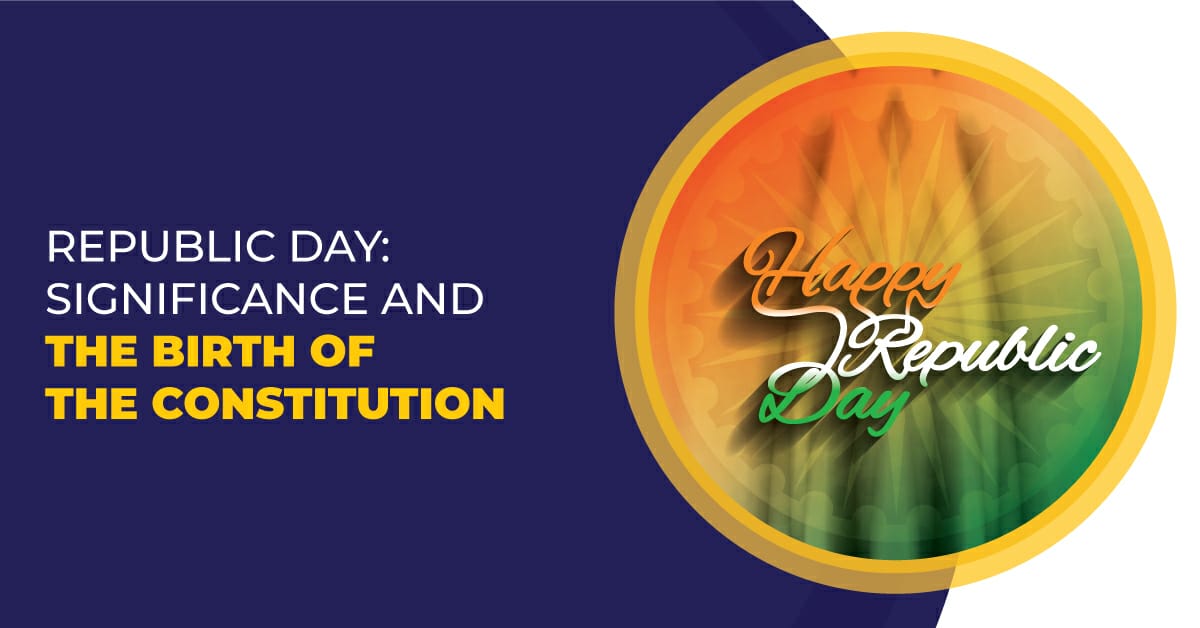REPUBLIC DAY : SIGNIFICANCE AND THE BIRTH OF THE CONSTITUTION
 Posted On
Posted On
543 total views, 1 views today
“Constitution is not a mere lawyer’s document, it is a vehicle of Life, and its spirit is always the spirit of age.”
-BR Ambedkar, father of Indian constitution.
Republic Day is celebrated on 26th January every year with great zeal and pride. It marks the day when India got truly independent and accomplished the historic Purna Swaraj. On this day, people forget their religion, caste, creed, sex, and more while bringing together the whole country, thus showing diversity.
Birth and the Significance of the Constitution
The Constitution of India became effective on 26th January, 1950, thus making it as one of the most important date in the political history of India. The day also signaled the evolution of India from a British colony to a sovereign, secular, socialist and a democratic nation. The beginnings of a democratic nation were introduced at the Lahore session of the Indian National Congress at the wee hours of 31st December 1929. The session was led by Pandit Jawahar Lal Nehru and it was decided that January 26, 1930 would be ascertained as the Purna Swaraj (complete Independence) Day. Lahore session also carved the way for the Civil Disobedience Movement in the nation. Post lengthy debate between the Indian leaders and the members of the British Cabinet Mission, Constituent Assembly was established which met for the first time on December 9, 1946.
Cabinet Mission approached to India to discuss the transfer of supremacy from British government to the Indian leadership. The aims of the mission were to formulate a machinery to map out the constitution of Independent India and to make provisions for the temporary government. The Mission further made certain recommendations wherein they suggested that Union of India will deal with the defense, foreign affairs and communications. Additionally, they recommended an undivided India and turned down the Muslim’s league demand for a separate Pakistan. The Mission also provided for foundation of the Constituent Assembly on democratic principle of population.
The intent of the Assembly was to give India a long-running constitution which would give influential manifestation to the important promises of equality, liberty, democracy, sovereignty and a diverse identity to its citizen.
Prominence of Republic Day
India became a free nation on August 15, 1947; however, it only relished the exact shade of Independence on January 26, 1950 when the Constitution of India entered into effect giving India its political freedom. On this day India dropped the hat of colonial system and achieved a morn by becoming a Sovereign Democratic Republic. The word ‘Sovereign’ denotes that India is neither a dependency nor a dominion of any other nation, but an independent state. There is no power above it, and it is free to bear its own affairs. The word ‘Democratic’ is grounded on the canon of popular sovereignty, that is, ownership of the absolute power by the people, of the people, and for the people. The word ‘Republic’ on the other hand entails that India is a country which has an elected or nominated president rather than a monarch.
Official Celebrations/ Award Ceremonies
Republic day is an occasion to honor the beliefs of our democracy and Republic, to reiterate our pledge to freedom and equality across our society and among all our people. The day revels the yearning of a vast nation that want to be administered through one single constitution setting another benchmark of India’s unity in diversity.
Indians celebrate January 26 each year with lots of enthusiasm. The capital city of India, New Delhi, rejoices it with a Parade that highlights the valor of the Indian Military and the cultural diversity of our country. These parades take place in other cities as well, where a lot of schools participate in. Also, Padma Awards namely, Padma Vibhushan, Padma Bhushan and Padma Shri are given on this day by the President to the people for their distinguished and exceptional contribution/service in all fields. National Flag is also hoisted on this day by the President of India followed by several guns salute and the national anthem played by the military band.
Rabindranath Tagore speaks the true spirits of our motherland in his poem “Where the mind is without fear and the head held high; Where knowledge is free; Where the world has not been broken up into fragments by domestic walls; Where words come out from the depth of truth; Where tireless striving stretches its arms towards perfection; Where the clear stream of reason has not lost its way into the dreary desert sand of dead habit; Where the mind is led forward by thee into ever-widening thought and action–Into that heaven of freedom, my Father, let my country awake.”



